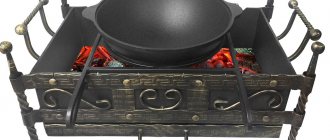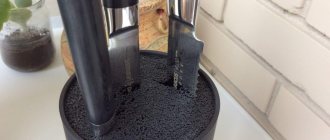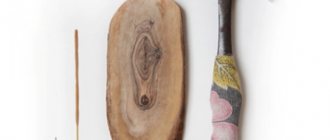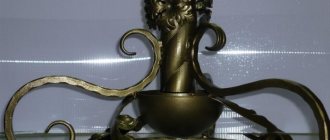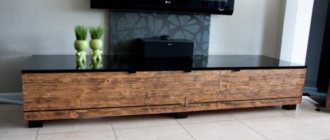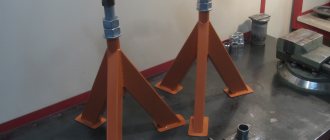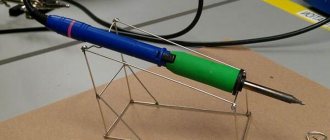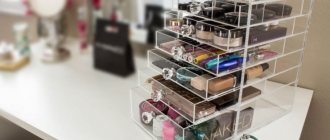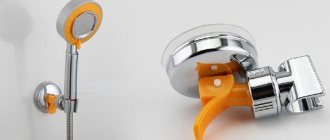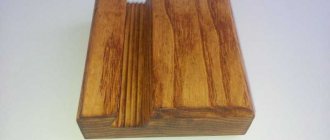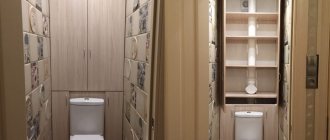Books, in any form, will always be in fashion, as well as bookshelves for them. But homemade book stands can add variety to even the most dull interior.
A modern book holder can be of any shape.
Often it reflects the interests of the owner of the house, his passion for a certain topic or genre, and commitment to a certain style.
The main purpose of this simple device is to preserve good vision in children, since a vertically placed book does not strain the pupil, preventing changes in the structure of the eye lens. Also, modern design solutions are focused on minimalism and comfort, and a book stand in this case is indispensable, because it frees up space at the desk.
The shape of the book holder depends only on the imagination and interests of the owner.
This is not only a convenient device, but also a magnificent interior detail.
In order for an elegant accessory to decorate your home, just a few hours of free time, imagination (and the World Wide Web will help you get interesting ideas), patience and perseverance. A book stand can be made without any special material costs, because the material can be used: toothbrushes, cardboard boxes or wooden planks, children's toys, plaster or plywood and even wallpaper left over after renovation.
Even the most unnecessary things will help turn an amazing idea into reality.
Wooden stand
The classic material for creating a stand is wood. At the same time, you can use either wooden planks, a wooden block or a log. In this case, an indispensable auxiliary tool will be sandpaper or a sanding machine, which eliminates flaws in the wood and gives it an aesthetic appearance.
This stand can be made from boards or plywood.
You can also make a wooden book stand with your own hands, “breathing new life” into an old kitchen board. It is enough to attach a book holder to the front and a holding bar to the back. The material can be decorated with decorative paint of one or several tones (for example, like the popular ombre). The finished product must be thoroughly dried.
It is suitable for reading books, as well as for tablets and other electronic devices.
Important! There is no rush in carpentry work, so think carefully about how the finished product will look. It would be good to make a layout and take all the necessary measurements, and only then start processing the parts.
It is very convenient to use a stand in the kitchen for a recipe book.
Plywood can be an excellent substitute for wood when making book stands. To do this you need:
- cut a sheet of plywood into 5 parts: 20x1x2 cm - 2 pcs.; 18x3x2 cm – 1 piece; 20x5x2 cm – 1 piece; 34.5x20x2 cm - 1 piece;
- then cut grooves for the legs in the largest board;
- in the place of the cut grooves, glue the front parts of the workpiece in the center;
- put a press on the glued parts and dry;
- Next, you should glue the legs and also dry them under pressure.
If desired, you can decorate the stand by carving or burning wood, paint it, or varnish it.
Additional Information. Parts can be dried one at a time if there is no special vice. For this you can use any weighting material.
Methods for attaching shelves
In this case, it means fastening mainly wall shelves and some corner structures.
Most often, the fastening method is standard: metal plates with holes are installed in the back of the shelf.
Let's look at this whole process step by step. Holes are drilled in the wall according to the markings, dowels are driven in and screws are tightened. Then you just have to hang the shelves and you're done.
Floor shelves, as a rule, do not require any fastening. True, there are also suspended structures. They are attached to the ceiling or ceiling beams using ropes or metal chains. Sometimes - against the wall.
Today, when making a wall shelf with your own hands, the so-called hidden fastening method is often used.
For example, you can make a metal frame of suitable size from a profile pipe, which is then attached to the wall. After this, the shelf itself is assembled from boards, chipboard or plywood, in the form of a box.
The shelf simply “slides” onto the frame, and it won’t go anywhere. You can read more about this method of fastening in our article.
A similar method of fastening can be done without using a metal frame. In this case, a plank with wooden dowels is attached to the wall. First we make the shelf itself.
You need to drill the appropriate holes in the shelf. It is simply put on the dowels. However, this design is not designed for heavy loads.
This is important to understand. Read about this mounting method on the website
There is another option that is useful when installing a shelf in a niche. Grooves are selected on the sides of the wooden shelf to the required depth, and metal guides are attached to the walls inside the niche itself.
Then the shelf is simply “slipped” onto these guides, and thus securely fastened. This is how easy it is to make home furniture with your own hands.
If you are interested in this method of fastening, you will find all the detailed information with step-by-step stages of work, including a photo and video review, in the article.
Cardboard stand
If you are wondering how to make a paper bookend, use cardboard.
You can also make such a stand from corrugated cardboard.
- Cut out 2 identical rectangles, each 35x42 cm in size. Bend them 14 cm on the long side and glue them into one piece.
- Cut out 2 more rectangles measuring 5x14 cm and also glue them together.
- Glue the small and large triangles together as follows: glue one end to the smaller part of the folded rectangle at the edge, and the other to approximately the middle of the larger part. Carefully lubricate the joints with hot-melt adhesive.
- Cut out the piece 29.5x10 cm and fold it in half.
- Cut a rectangle 2 times smaller in width than the previous one. Glue the parts from steps 4 and 5 to form a triangular cylinder.
- Glue the cylinder to the large blank from below.
- Cover the workpiece with newspapers and napkins, paint and varnish.
Very light, compact. It can also be made from plywood.
Triangular shoe rack made of cardboard boxes
You will need:
- cardboard
- scissors or stationery knife
- Ruler and pencil
- wide tape.
*Each module in this shelf is a triangular tube. Its size depends on the shoe size.
First you should make one module.
1. First, cut the cardboard, divide it into 3 parts with a pencil and a ruler, bend it into a triangle and secure with wide tape.
2. Create some more modules in this way.
3. Each row of triangular modules must be glued to a sheet of cardboard for stability.
4. You can put another cardboard on top.
Ironwork
You can forge a real work of art from iron. But how to make a book stand out of iron if you are not a blacksmith? - using wire. The flexibility of the material can give it any desired shape. For a book accessory you will need a wire with a diameter of 4-5 mm, 4 pins with a diameter of 1.5 mm.
It’s not difficult to make an elegant interior book support; you just need to have imagination and some craft-making skills.
For such creativity, all kinds of, but at the same time, affordable household items will be useful.
DIY flower stands
The most affordable material for making a flower stand at home is wood. For work, you can use old shelves and unnecessary parts of home furniture.
Classic wall flower stand
In order to make such a design, you will need very little available material, tools and a little patience.
You need to prepare in advance:
- shelf or board made of wood or chipboard,
- a decorative element for connecting the structure (in this case, a strong tree branch of a suitable configuration),
- drill,
- saw or jigsaw,
- screws,
- paint,
- varnish,
- pencil,
- brush,
- roulette
The choice of material and fasteners depends on the future load on the stand. It is clear that the larger the dimensions of the product, the more reliable the fasteners are needed.
Master class on making a stand for indoor plants
- Take measurements of all overall dimensions of the future product, taking into account its location and flower pots.
- Cut out all parts of the product in accordance with the drawing and measurements, drill holes for fastenings.
- Process the parts, cut edges, and the base knot for the stand.
- Connect the parts together in accordance with the product sketch.
- Paint the finished product and varnish the surface.
Stands, racks, shelves or racks for indoor plants made of wood require additional surface treatment to prevent moisture. With a high-quality approach, they will last a long time and perfectly decorate the interior of the room.
Hanging structure for flowers
The hanging structure for pots with hanging plants looks original. It is convenient and easy to make.
To implement your plan, you will need several pre-prepared shelves, a strong rope and a drill.
- In the shelves you need to drill two holes on each side. Their diameter must correspond to the diameter of the rope.
- The rope is passed through the prepared holes and fixed at the desired level using knots.
- The original stand is secured with ropes.
This option for placing flowers is ideal for a window sill or loggia. This design is not massive, so it will not greatly shade the room.
A variety of shelving can be made from wood. Their shape can be classic, in the form of a ladder, asymmetrical, and so on. The design can be straight or angular. The main requirement for the product is its aesthetics and durability.
Metal flower stands
Metal stands and stands for plants are beautiful, reliable and very popular
It is important to take into account that such a stand will be a very original decorative element, so you need to work hard on the idea so that it fits well into the interior
For the manufacture of such products, forging is used or a welded structure is performed. You'll have to work hard on it. Then the product must be carefully treated against corrosion and carefully painted.
Such stands are usually made on the floor or mounted on the wall. They have a large margin of safety and are able to withstand large flowerpots.
The shape of metal stands is very diverse. These can be classic racks for two or three places, familiar from Soviet times, or openwork structures in the shape of an old bicycle, wheel, ladder, and so on.
Plastic stands
Typically, such stands are made from leftover laminate or plastic panels. The material is not at all afraid of moisture; structural elements can be painted in any color using acrylic paint.
In addition, finished plastic products are often used in work, supplemented with decorative elements. This category of products can easily include stands made from used plastic containers.
Glass coasters
They are difficult to manufacture because they require experience and careful processing of sections. In addition, they require constant care and are not able to bear a heavy load.
Combined stands
There are a lot of product design options and materials to realize your plans. Often wooden shelves are mounted on metal supports and racks. This gives the structure additional strength.
These stands look original. They can be floor mounted, attached to a wall, or decorate a window sill. Their size and appearance depend on the installation location.
It’s not difficult to make an original and convenient stand or shelf for flowers with your own hands. In addition, it is much cheaper than purchasing a finished product in a store. In addition, the individually made stand is as comfortable as possible and meets all requirements.
Plaster stand
No less attractive for designers are handmade book holders. To realize the most intricate ideas, you can use gypsum.
Book holders in the shape of plaster hands will fit into a variety of interiors.
Prepare a mixture of plaster and water.
Important! In this matter, you need an assistant, because it is better to hold the form horizontally rather than vertically.
Such a magnificent designer item can be made from plaster, for example, imprinting your hand, foot or any object. First of all, you need to stir the alginate to a dough-like state. As a form, you can use a regular box sealed with adhesive tape.
To find out the amount of mixture required, pour water into the glove.
Make a hole in the box for the hand and first pour out part of the alginate to the level of the hand, and after a minute the remaining mass. After about ten minutes the arm simply extends. Fill the resulting hole with plaster. Leave to dry overnight. Then cut out the alginate and take out the plaster arm. Cover with paint and glue to a wooden board. Instead of a hand, you can use any other shapes, for example, like the elephant in the photo.
Plaster book stand in the shape of an elephant.
Additional Information. The remaining small lumps and bubbles in the alginate liquid do not affect the result.
Knife holder with filling
You can make an original knife stand with filling with your own hands. At the same time, it would be nice for her to come up with an interesting design that would match the interior of the kitchen. For this device, you should select suitable materials and take into account some design features of the housing.
Fan stands look very interesting with a series of shades PHOTO: knifecenter.com
Making the base: possible options
The container, which will play the role of a stand for kitchen knives, can be made of different materials that differ in texture. For example, the housing for an accessory is:
- from a plastic pipe of sufficiently large diameter. Typically, a previously unused sewer pipe (residue) is used for this purpose. In order for the frame to be complete, stubs are also used. A similar DIY plastic knife stand can have a spectacular decoration in the form of a painting or an accessory;
- from wooden blocks. To do this, you will need five pieces of material of the same thickness. Using separate walls, you can form a parallelogram, which will become the basis of the stand;
- An old book or any culinary collection that you do not use can also serve as a base. But there is a drawback - you cannot store wet, just washed knives in such accessories.
The stand itself can be made from other materials, for example, used wine bottles, measuring cups. Sometimes even unnecessary piggy banks are used.
Don’t forget to make a preliminary drawing PHOTO: golos.id
Types of fillers
You can use anything you can get your hands on as fillers. The main thing is to make the structure reliable, airtight and convenient for inserting tools. Among the available materials are the following.
Bamboo sticks. A sufficient number of them will be required. It is necessary that the material occupies the space in the stand as tightly as possible, of course taking into account the fact that additional knives will be placed inside
Please note that the length must be sufficient for the blade to fit completely.
Cereals and legumes. They look impressive in a transparent stand, especially if the layers alternate
Peas or beans of different colors are often added. This decor becomes truly interesting and accents the kitchen. Long grain rice absorbs moisture well, so you can insert knives into it immediately after washing.
Plastic bristles from brushes. To install the knife stand inside the brush, you just need to cut it off in solid bundles. One brush may not be enough for this purpose. To seal the insert, you can use two or three tools.
Sawdust or small wood shavings. A DIY knife holder with this filling is intended exclusively for dry tools. If you place a wet knife inside such a stand, mold will soon form inside.
Original separate stand for dessert knives PHOTO: m.123ru.net
From other materials
You can also make a book holder from stone yourself. In the simplest case, you will need two massive stones, spray paint, and cork adhesive pads so that the stones do not scratch the surface and move easily. The stones must be painted, for example, in fashionable gold or silver colors. Glue cork pads to the dried stones.
Making stone book supports is even easier: just find a suitable cobblestone on the street, cover it with paint and varnish.
A holder made in this way can take on any appearance depending on the author’s imagination.
To make a book holder out of concrete on a shelf with your own hands, first of all, you need to oil the mold. Next, knead the concrete until it forms a dough. Fill the molds with concrete and leave to dry overnight. Separate the seized parts from the molds by tapping them with a brick or hammer. Sand the bottom of the future stand. At the end of the form, paint it or leave it as is.
Once the paint has dried, the endpapers are finally ready to hold the books.
Additional information: to get rid of bubbles, you need to tap the container with concrete and shake it.
Minimalist, durable tree branch holder design. A nice addition to a row of titles on a shelf.
Antique-looking owls are massive and detailed.
If the classic options are boring, then the following will help answer the question of how to make a creative book stand with your own hands:
- Handsets of old wired telephones;
- Kids toys;
- Pillows of different shapes.
Such a soft pillow stand would be perfect for a child's room.
You can also cut a toy animal, such as a giraffe, horizontally. Glue the back part to the left holder, and the front part to the right one.
A witty holder in the shape of a dachshund is another find for extraordinary people or a gift option.
Good luck in your creative pursuits!
The animal book holders covered with sheep's wool turned out to be soft and textured.
How to make a book shelf with your own hands
Furniture manufacturers offer a fairly large assortment of bookshelves, racks and cabinets of various designs and prices. You can buy shelves for books, or you can make them yourself, which is not at all difficult. To make a bookcase, cabinet or shelf yourself, all you need to do is draw up a project, buy the material, have the necessary tools and minimal experience working with it.
The simplest shelf you can make yourself
So, in order to make a bookshelf with your own hands, you may need the following materials:
- laminated chipboard or MDF;
- wood or plywood;
- plastic;
- glass;
- metal.
Related article:
Laminated chipboard is the most common material for making bookshelves
You can use one of these materials or combine them, which will create quite original shelves for books. As for tools and components, you will definitely need:
- tape measure and ruler;
- electric drill and screwdriver;
- Screwdriver Set;
- nozzles for tightening fasteners;
- stainless steel furniture pipe with Æ16 or 32 mm;
- confirmations;
- screws 16×3.5, 20×3.5, 30×3.5 and 50×3.5 mm;
- edge;
- iron or hair dryer;
- PVA glue.
Necessary tools for making furniture
We make our own bookshelf from wood or chipboard
In order to make any furniture, you first need to create a sketch and drawing. We have already written about how to do this using the PRO100 program on the pages of our online magazine in the article “How to make a wardrobe with your own hands.” If it is not possible to use the program, then the drawing can be made on a regular notebook sheet in a box, where each cell will indicate 10 mm. We will show you how to make a designer book shelf using the PRO100 program as an example. As already mentioned, a designer item is something that is made in very limited quantities.
Photo Description of work
First, let's model our rack. This visualization will help you imagine how the finished shelf will look in the interior.
For ease of work, you can divide the sketch into separate parts. At this stage, you can already accurately determine the dimensions, which means choosing the right raw materials and accessories for assembling the shelf.
The sketch shows the basic fastening points
Connecting using cokes (cylindrical wooden pegs) is the most difficult option, since additional devices and maximum care and attention are required. In principle, the same can be said about rafixes and minifixes
Assembly diagram on minifixes
This method is difficult for a novice furniture maker, since it is necessary to make very precise markings of the joints of two parts. However, the advantages of this type of fastening are that, if necessary, the shelf can be disassembled and assembled many times, and the structure will not become loose over time. In addition, the peculiarity of this fastener allows you to make the connection point invisible from the outside, which cannot be said about confirmations.
Assembly diagram using minifix and additional reinforcement with cokes. On narrow parts, when there is only one fastener on each side, additional fastening is needed, which will be provided by wooden pegs (cokes), completely hidden.
Beginners can master this simplified version of the shelf. And if you have carpentry experience, if you have the material, tools, imagination and desire, you can make the most unusual shelves for books on the wall.
The cost of homemade structures is much cheaper than purchased ones, and you also get the pleasure of knowing that they are made by yourself and are unique.
Related article:
DIY book shelving
Using the same principle as described above, you can make bookshelves. The difference lies only in the dimensions of the structures. Shelving can be made in almost any size and used as partitions, as well as for zoning space in studio apartments. Such book storage systems can be made of wood, chipboard, metal, and even scrap materials (pipes, pallets or logs).
Detailing of the rackThe joints of the parts are marked in red
1 of 4
Watch this video on YouTube
What is needed for production (materials and tools)
Before you begin, you need to prepare the following:
- paper and cardboard material – colored and white;
- glue;
- pencils - simple and colored;
- ruler;
- glue brushes;
- scissors;
- scotch;
- stapler;
- stationery knife.
For decoration, you may also need different decor. elements.
Bags for storing packages
Bags or napkins are often needed around the house. If you keep them in sight, it looks sloppy. You can see how to sew an organizer for them and not worry that such little things will ruin the aesthetics.
The organizer requires the following things:
- needle and thread;
- scraps of any fabric;
- a sleeve from a former item (or you can sew a new one);
- elastic or braid;
- scissors.
We make 2 round patterns from fabric and cut holes in them. We wrap the edges and sew them together. Insert an elastic band or braid into the opening that appears.
We sew the patterns to the sleeve on both sides and make a loop on the right side at the top. The result is a bag that can be filled with small items and hung on a hook. It definitely won't be conspicuous.
Convenient homemade bookends made from whatever is on hand
Sometimes, reading for a long time, your hands can get tired, and although you want to continue an exciting activity, you need to change your position and free them so that the book does not fall. If there is no convenient holder nearby, then it is quite possible to make it yourself from improvised means available in every person’s home. Such a product, despite its simplicity, will be simply an indispensable companion for those who like to study something new and interesting in the future.
Let's take a look at two fun, easy ideas that make great bookends.
Desk order: 15 ideas on how to organize your school office
How to store school supplies in the room so that everything is at hand, you can always quickly find the item you need and at the same time maintain order on your desktop? The answer is very simple - make an organizer for the school office that will help organize everything.
With the beginning of the new school year, every schoolchild begins to accumulate whole mountains of office supplies on his desk. And sometimes, even a comfortable and beautifully designed study area in a children’s room is not immune to clutter on the table.
But you can very easily avoid chaotically scattered pencils, rulers and pens by organizing your school supplies in the appropriate way.
Make a special office organizer to always keep your desk tidy and clean.
We found 15 options for office organizers that will appeal to both older and younger students. Perhaps even one of the parents will get ideas for organizing their workplace or creative corner. Be that as it may, everyone will be satisfied with the result.
15 ideas for storing school stationery
The most effective way to avoid cluttering your work surface is to store all your office supplies in a drawer.
This way, you will get additional space on your desktop for doing homework or other type of work, and all your office supplies will be hidden, but always at hand.
School stationery in a drawer also needs to be properly organized, so use plastic containers or cardboard boxes to organize cells for each type of stationery.
A convenient organizer for school supplies, which will fit both office supplies and notebooks, can be made from breakfast cereal boxes. Trim the boxes to the desired height and decorate with decorative tape or fabric, securing all the boxes together.
Also use cardboard toilet paper rolls to make an original office organizer. This craft made from bushings will surprise anyone.
And if you place the organizer from the sleeves in a beautifully designed shoe box, you will get a convenient portable organizer for your school office.
To organize your workplace and store your office supplies, you can use cans of baby formula or coffee. Simply decorate your mix jars using wrapping paper in your favorite color.
An office organizer made from baby formula cans can be placed on the table in a row, in a circle, or folded into a pyramid. You can also place such an organizer on the wall with your own hands, after first attaching the cans to the board.
An organizer for various office supplies made from ordinary glass jars will look quite original. True, there is always a risk that such an organizer, even from cans that are well secured one on top of the other, may break. Therefore, only teenagers and parents should put jars in an organizer in this way.
But the office of junior schoolchildren can also be organized into banks. Just allocate a jar for each type of stationery, decorate the tops of the jars with your child’s old toys and paint everything with the same color. Beautiful and practical!
Preparing your desktop
First of all, you need to prepare your table on which you will work. There should be no unnecessary things on it and every tool should be at hand. Not everyone has their own desktop and has probably already thought about creating one. Making a table is not difficult, but choosing a place for it in the house is difficult. The ideal option is an insulated balcony, on which you can do crafts at any time. I have already written about preparing the table in a separate article and tried to describe in as much detail as possible the entire process of creating it. If you don’t know how to prepare your workplace, then read the following Article. After you have completed the process of creating a table, try to start choosing your future craft.
